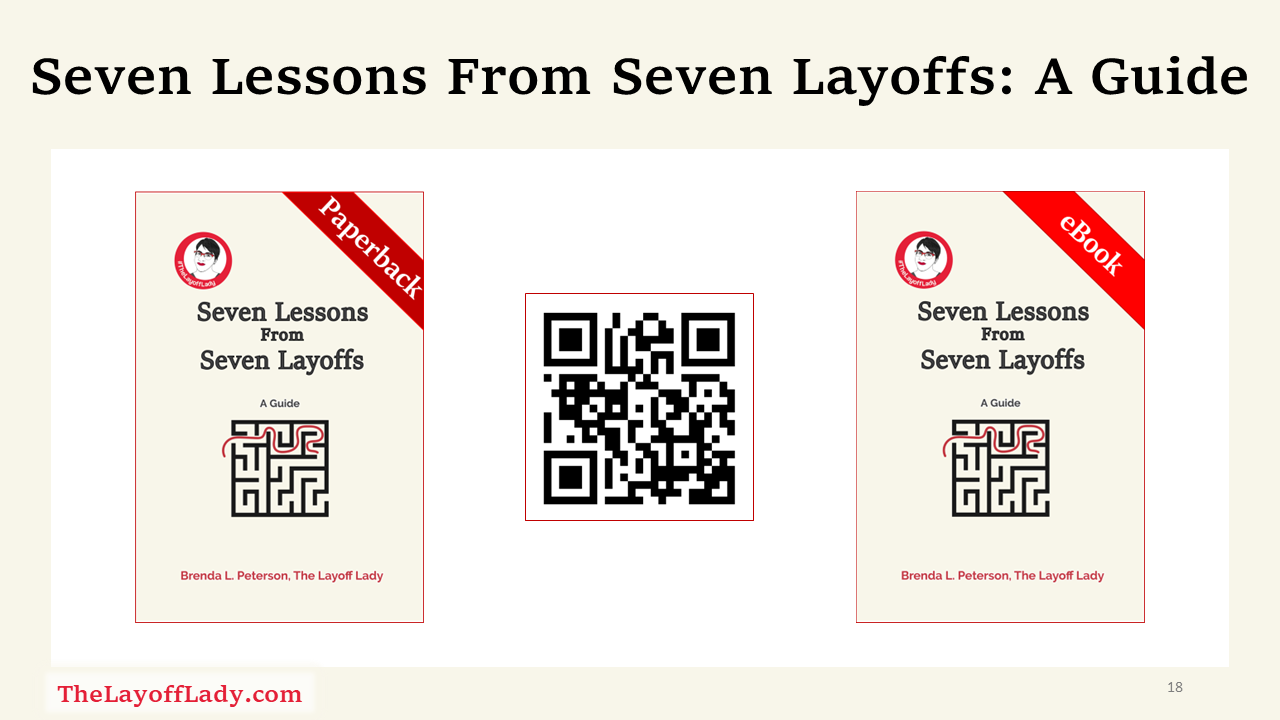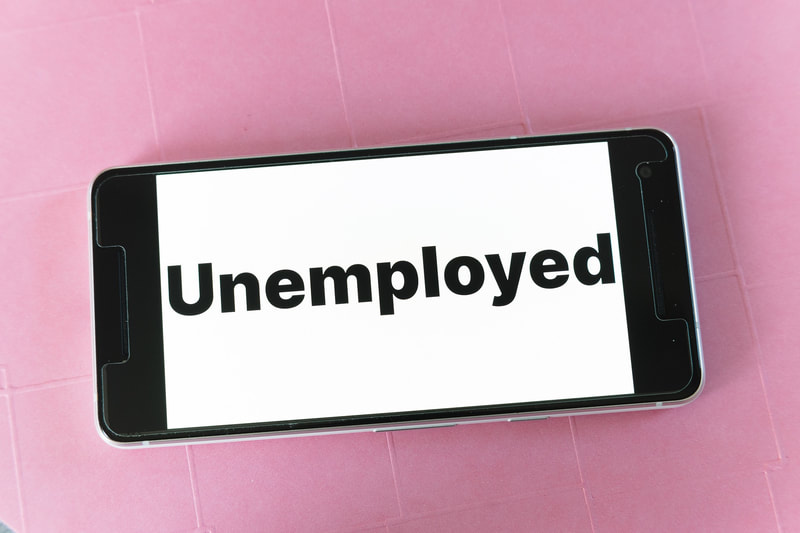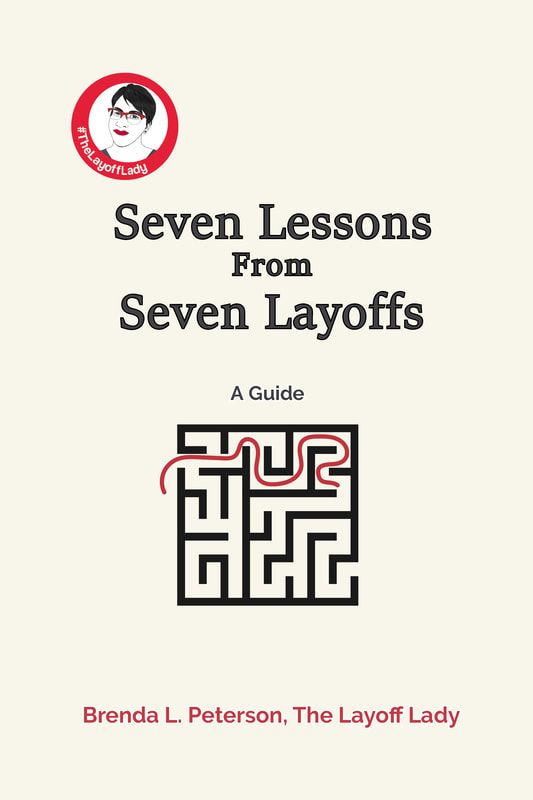|
By Brenda L. Peterson, The Layoff Lady Don't Go It AloneLife is challenging when nothing in particular is happening. When you're going through a job change (especially one you didn't plan), it's even harder. While I'm a fan of self-reliance, I also know the value of finding people who want to support you and letting them do it. You're not weak for needing people. You are smart for planning ahead for what you will need. You Need Help Because This is HardI have been through a post-layoff job transition 7 times, and it is difficult each and every time. There is the fear that it will just never end, and you'll be drifting for eternity trying to find paid work where you can pay your bills--much less in a job you want. You worry that you'll have to settle for something that may be even worse than the worst job you've ever had. You also worry that you'll run out of money and not be able to pay your bills and lose everything you own and everyone you've ever loved. While your rational mind knows this is all pretty unlikely, there will be moments when everything seems hopeless. That's where your support network comes in. No matter how resilient and downright badass you are, doing this alone makes it way harder. People Want to Help You: Make Sure to Let ThemAs an extra added bonus, people want to help you! I'm always inspired by people who come out of the woodwork to check on me, tell me about an open position, thank me for helping them once upon a time, or offer to refer me for a role. Everyone has struggled with something at one time or another, and someone has helped them. Let other people help you. Building Your TeamIt also takes a village to get you through a career transition. Relying on one person for everything is all kinds of stressful. Know that people want to help, and it's a matter of figuring out what you need, letting people know, and reaching out to people when needed. Going through a job search is challenging, even in the best of circumstances. It can be even more challenging if you're starting from a layoff (especially the part where someone else got to make a big, uninvited life decision for you). Types of Help You NeedHere's a starter list of the types of help you may need during your job transition. More specifically, here is some of what I needed. Use this as a starting point and add details as it helps you:
Who Can HelpWhen it comes to help, I start with my inner circle--close friends and family. I'm also sure to widen my support team beyond them, too. I also move beyond that immediate group. I interact with my LinkedIn connections. I tap into online groups including job search groups, The White Box Club, and even LinkedIn groups focusing on networking or a content area (like sales enablement). I interact with in-person membership groups like ATD or the Omaha OD Network. Or I seek out non-work connections through social Meetup groups or activities. Sometimes, I just spend time in coffee shops to indirectly interact with other people. It's a matter of figuring out what you need and finding a person to help. Asking for HelpKnow, too, that there will be times when you need to straight up reach out to someone because you need help. Each person will have their areas of interest and expertise, so be sure to keep that in mind when asking for help. It's helpful to consider who you might contact for different needs. Here are a few cases where I reached out to different people to ask for help:
Learn More
0 Comments
By Brenda L. Peterson, The Layoff Lady About The Seven Layoff LessonsThrough my seven layoffs and many conversations with others in post-layoff career transition, I have learned seven core lessons:
About Layoff Lesson Five: Help People Help YouLife is challenging when nothing out-of-the-ordinary is happening. It's even harder when you're going through an unexpected job change. While I'm a fan of self-reliance, I also know how important it is to find your people and support one another as you go through challenges. You're not weak for needing people. You are strong because you know the value of building and leveraging relationships to help get you through trying times. I have found that people genuinely want to help. In many cases, though, they might not know what you need. Not only is it vital that you seek out help when you need it, but you need to figure out what type of help you need. One Career Transition RevelationHere's something that might surprise you. When you tell people that you're looking for a new job, this is when you will discover that many people don’t know exactly what it is you do for a living. Instead of being taken aback that they don’t know, use this as an opportunity to learn how to tell them what you want and need during your career transition--and it's much more than just a new paying job. Figure Out What Life Help You NeedFirst off, you need to figure the types of life help you might need:
Figure Out What Job Search Help You NeedIn addition, you need to figure the types of job search help you might need:
It Takes a VillageOnce you have a better idea of what you need, make sure you don't expect one person to fill all of these roles. Think about who could help you in each area and reach out to them. Leveraging Your Professional NetworkLinkedIn is my goto tool for building and managing my professional network. It's importan to make sure your LinkedIn profile represents you well, and that you showcase your experience and the value you bring to others, and to a new role. There is also an art (and a process) to asking people in your professional network in a way that is mutually beneficial. For The Whole StoryFor all the information on each of the seven lessons pick up a copy of my book Seven Lessons From Seven Layoffs: A Guide. Learn MoreBy Brenda L. Peterson, The Layoff Lady Rejection and Negative EmotionsBeing jobless post-layoff and searching for a new role is a rough process riddled with rejection. It starts with your former employer kicking you out of the whole company and, in essence, saying, “You are no longer one of us.” At every step of the way, you’ll experience people telling you no in a variety of ways. Here is how that rejection may look. Applying for a job and:
Having what felt like a great interview for a job and:
Receiving a job offer and:
Accepting a job offer and:
The Necessity of Experiencing Your Emotions Because of all of the uncertainty and rejection, this whole process can be a lot to bear. It’s hard to keep going when there are obstacles at every turn. Sometimes, even well-intentioned people trying to be supportive ask just the wrong question and make you feel even worse. Often, I find that when people are exceedingly negative, they usually have not taken the time to address their emotions. Consequently, those hard feelings fester, come out sideways, and interfere with the business part of job searching. Their complaining comes from a place of fear, pain, sadness, and anger. Unfortunately, as with much of life, it’s nearly impossible to complain your way out of your current situation and into a better one. Instead, it’s paramount that you experience your emotions, then manage your mindset so you don’t let your feelings make the already complicated process of finding a new job even harder. Coping StrategiesHere are a few ideas for strategies to help you work through the unpleasant emotions that will pop up during your career transition. Acknowledge Each EmotionBefriend your feelings. Don’t pretend that you don’t feel how you do. Name them, acknowledge them, and then move on. Pretending those unpleasant feelings don’t exist will not make them disappear. Instead, it may silence them for a bit, but they will pop up later, usually at the worst possible time. Acknowledging each one will help them run their course–and also help you to increase your ability to manage those feelings. Wallow a Little It’s impossible to will yourself into feeling better. Sometimes, you need to just sit with an uncomfortable feeling for a while and let it run its course. Cry a little. Rewatch your favorite movie for the bijillionth time. Have a little ice cream. Do a puzzle. Take a walk. Take the afternoon off from your to-do list. Some will run their course a bit more quickly than others. Research The ProblemIf you’re worried about something, researching answers and managing your expectations often helps. How many job applications does it typically take to get an interview? How long does it take most people to find a new role post-layoff? Which companies are hiring? You'll probably feel a little better by researching options, clarifying goals, and taking useful action. Even if you don’t find a complete solution, you at least know more. Having added knowledge will help you worry less or at least direct your worry toward taking productive action that will help you solve a problem. Take a Social Media BreakSocial media, specifically LinkedIn, can be a great job search tool. Unfortunately, it can also give you the illusion that everyone else is doing great and you are downright hopeless. Posts like “It only took me a week to find my dream job,” or “I’m still employed but I feel SO BAD for my former coworkers who are jobless,” or “Every company ever is doing more layoffs” will only make you feel worse. Remind yourself that social media isn’t real life and disengage. Leverage Basic Self CareWhen everything feels hard, taking care of yourself needs to be one of your top priorities. Here are a few quick and easy ideas to make you feel almost instantly better:
Learn MoreBy Brenda L. Peterson, The Layoff Lady Managing Curious and Well-Intentioned PeopleOne of the hardest things about being laid off is telling other people about it--specifically fielding their uninvited questions. I'm not talking about work people or your professional network, either. I'm talking about the family friend you run into at the grocery store, that parent you went to a PTA meeting with once and the neighbor you seldom see. Worse yet, it is interacting with a group of well-intentioned people who express their curiosity, worry, and opinions regarding your well-being. Here are a few suggested talking points for managing those conversations that pop up at just the wrong time. Getting Your Patter DownAfter you've chatted with your inner circle--those people with whom you share your raw and uncut thoughts, feelings, and worries--it’s time to think about how you talk about this with all the rest of the people. It is those people who make random comments, who don't really know how layoffs go, and who might be trying to be helpful or supportive or to give you advice on a situation that is foreign to them. These conversations may be rough for you, especially if you're feeling vulnerable. Your goal may be to get through the awkwardness and move on to other topics. To prepare, it is helpful to have an idea of how to respond. Here are a few suggestions for talking points to get you through. Talking About Your Current State and Plans
Talking About The Job You No Longer HaveThe question: I heard you’re unemployed. What happened there! Your core message: My job ended. It is a thing that happened.
Talking About What Is Next For YouThe question: What are you going to do now? I would be freaking out. Or I’d be scared to death if I were you. Are you sure you’ll be okay? Or A person I sort of know lost their house/was unemployed for years/had to take a pay cut/never worked again. Your core message: I’m going to keep on living and also look for a new job.
Talking About STILL Not Having a JobThe question: So--do you have a job yet? Or Are you STILL unemployed? Or Did that thing you were interviewing for work out? Your core message: I am job searching and something will work out.
Acknowledging People's ReassurancesThe question/comment: Don’t worry. It’ll be fine. Hang in there! You’re so talented! Your response: Thanks. Addressing Well Intentioned and/or Awful AdviceThe comments:
Learn More
|

Just get laid off?
Click here for info on what to do first. Author7-time layoff survivor Brenda L. Peterson, The Layoff Lady, waxes poetic on layoffs, job transitions, & career resilience. Buy The Book!Were you recently laid off from your job and need a roadmap for what's next? Pick up a copy of my book, Seven Lessons From Seven Layoffs: A Guide!
Categories
All
Archives
July 2024
|











